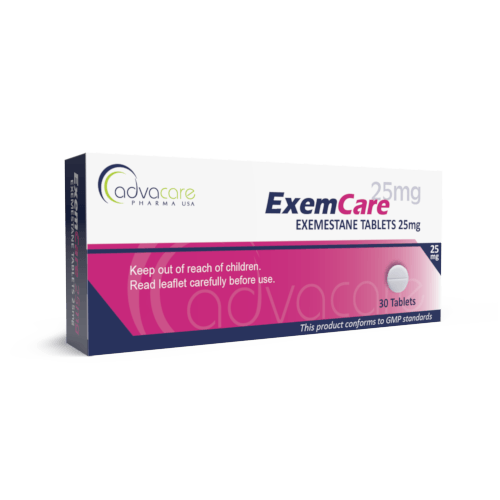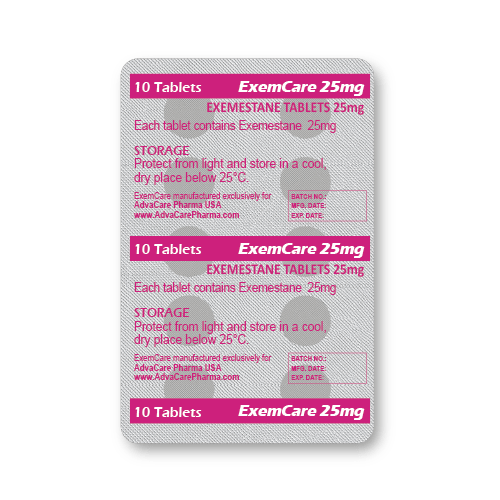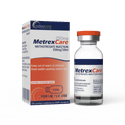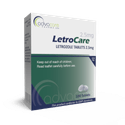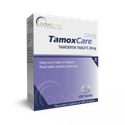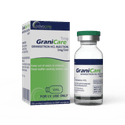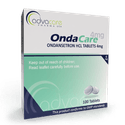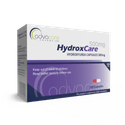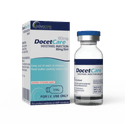- Home›
- Pharmaceuticals›
- Oncology Products›
- Oncology Tablets›
- Exemestane Tablets
Exemestane Tablets
Dosage
Packaging
What is Exemestane?
Active Ingredients: Exemestane
Exemestane Tablets are an antineoplastic drug used to treat certain types of breast cancer. It is typically used for the treatment of breast cancer in postmenopausal women who need particularly aggressive therapy. Exemestane is also indicated for patients whose first-line defenses, such as tamoxifen, have not worked.
This drug is sometimes prescribed to help prevent breast cancer in high-risk individuals and occasionally for premenopausal women who are receiving ovarian suppression.
Exemestane is an antiestrogen agent that is used for the treatment of hormonally-responsive breast cancer. About 7 out of 10 types of breast cancer have estrogen receptors.
Exemestane is classified as a steroidal aromatase inhibitor. The active ingredient lowers estrogen production in the body by blocking the aromatase enzyme, which is the enzyme responsible for estrogen synthesis. The reduction of available estrogen may slow or stop the growth of hormone-sensitive cancer cells.
Exemestane Tablets are produced with a dosage of 25mg. They are available as a box of 30 tablets.
This medication is produced and exported by AdvaCare Pharma. These Exemestane Tablets are manufactured in our facilities in China, India, and the USA. Our factories comply with WHO guidelines and standards, and we regularly inspect these facilities to ensure they meet these high standards.
Why are we a trusted Exemestane manufacturer?
AdvaCare Pharma manufactures Exemestane Tablets, one of 40+ oncology treatments, according to rigorous GMP protocols at our state-of-the-art production facility. We are committed to producing quality-assured, cost-effective cancer treatments that meet the highest industry standards and are readily available to cancer patients worldwide. As an established Exemestane manufacturer, we supply pharmaceutical distributors, hospitals and government institutions with reliable cancer drugs.
Uses
What is Exemestane used for?
It is used to treat breast cancer in postmenopausal women. It is used to treat early breast cancer for women who:
- have hormone-sensitive cancer
- have undergone other treatments, such as surgery or radiotherapy
- have taken tamoxifen for 2-3 years
- are using exemestane to finish 5 consecutive years of hormone therapy
It is also used to treat advanced breast cancer after a first-line medication, such as tamoxifen, is ineffective.
How should Exemestane Tablets be taken?
This medication is manufactured to be taken orally. They should be taken after a meal. Exemestane will be most effective if taken at the same time every day.
These tablets should be handled carefully, as this drug can be absorbed through the skin and lungs. For extra precaution, use gloves, and a mask. Be sure to wash your hands thoroughly after handling the tablet.
How should Exemestane Tablets be stored?
The tablets should be kept in their original blister packaging until use. It is recommended to store them at room temperature (20°C to 25°C) in a dry, dark location. This medication should be kept out of the reach of children and pets.
Before using this medication, it is important to check the expiry date and discard any outdated drugs in accordance with local regulations.
What dose should be taken?
Adult Dosing Dosage may vary based on different medical indications:
- For adjuvant treatment of breast cancer in postmenopausal women (hormone receptor-positive early disease), the usual dose is 25mg, taken once per day for 2-3 years. Exemestane should replace tamoxifen to complete 5 years of adjuvant hormone therapy.
- For breast cancer in postmenopausal women (advanced, progressive), the usual dose is 25mg, taken once a day. Treatment should begin after tamoxifen therapy for patients with progressive disease.
- For the prevention of invasive breast cancer in high-risk women, the usual dose is 25mg taken per day. The duration of treatment is 5 years. Some organizations suggest exemestane may be an effective alternative to tamoxifen or raloxifene. High risk is typically defined as one of the following: (1) at least 1 biopsy with lobular carcinoma or atypical hyperplasia, (2) 1 or more first-degree relatives with a history of breast cancer, or (3) > 1.66% 5-year predicted risk [Gail model].
- For patients who are also taking potent CYP450 3A4 inducers (e.g. rifampin, phenytoin) the dose should be increased to 50mg, taken once per day.
Renal Dosing There are no adjustments recommended for patients with renal impairment.
Hepatic Dosing There are no adjustments recommended for patients with hepatic impairment.
Pediatric Dosing Dosing is not defined for children and adolescents younger than 18 years old.
Refer to a doctor or pharmacist for guidelines on dosage. Do not exceed what they advise.
What happens if a dose is missed?
If a dose is missed, it should be taken as soon as possible if it is within 12 hours of the scheduled time. If it is been longer than 12 hours, then the dose should be skipped and the next dose should be taken as scheduled. It is advised to ensure the prescription is refilled in a timely manner in order to avoid running out of the medicine.
What happens if someone takes too much Exemestane?
In the event of an overdose, a doctor or poison control center should be contacted as soon as possible. The person may need to be taken to the nearest emergency hospital, if the person is no longer breathing or has collapsed, call a local emergency number.
Who can use Exemestane?
Exemestane Tablets can be given to adults, but caution is advised for specific groups of patients.
Pregnant The use of exemestane should be avoided during pregnancy. Though there is no human data available and no known risk of teratogenicity, animal studies have reported embryo-fetal toxicity and death at high dosage levels.
It is recommended to perform a pregnancy test for patients who are still in their reproductive years. The test should be performed within 7 days of beginning treatment. These individuals should be advised to use effective forms of birth control for the duration of their treatment and for at least 1 month after stopping therapy. Exemestane may affect the fertility of pre-menopausal women.
Breastfeeding There is not sufficient information concerning the effects of exemestane during breastfeeding. Therefore, the benefits must be weighed against the risks before using this medication.
Children There have not been sufficient studies performed to properly assess the safety and efficacy of exemestane for this population.
Geriatric Studies have not indicated that there are specific issues that would affect this population.
Other warnings
For patients with osteoporosis or who have a risk of developing it, it is advised to monitor bone mineral density (BMD).
Treatment with exemestane is not advised with the concurrent therapy of estrogen-containing agents.
It is recommended to assess vitamin D levels before starting treatment with exemestane, as vitamin D deficiency is common in women with early breast cancer.
Side Effects
As with all pharmaceuticals, some unwanted side effects can occur from the use the Exemestane Tablets.
Common side effects include, but may not be limited to:
- hot flashes
- hair loss
- joint/bone or muscle pain
- tiredness
- unusual sweating
- gastrointestinal problems (nausea, constipation, diarrhea)
- dizziness
- trouble sleeping (insomnia)
Some side effects are expected to improve after a few months of treatment. A doctor should be consulted if side effects are severe, aren't improving, or getting worse.
Contact a doctor or seek medical attention if the following develop:
- bone fractures
- fever (>37.5°C or <36°C) or signs of infections
- mental or mood changes, such as depression or anxiety
- vaginal bleeding
- persistent nausea or vomiting
- unusual tiredness
- dark urine
- yellowing of the eyes or the skin
For a comprehensive understanding of all potential side effects, consult a medical professional.
If any symptoms persist or worsen, or you notice any other symptom, please call your doctor immediately.
Precautions
Do NOT use Exemestane Tablets if:
- You are allergic or hypersensitive to exemestane or any of the other ingredients in the tablet.
- You are pregnant or planning to become pregnant.
- You have not gone through menopause and are still having periods.
Exemestane is known to interact with many other pharmaceuticals, including carbamazepine, phenobarbital, phenytoin, and rifampin. The dosage of other medications, including hormone replacement therapy or estrogen-containing drugs, may need to be adjusted before and after treatment with exemestane. Consult with your doctor about any medications, supplements, or herbal products (e.g. St. John's wort) you are taking before your treatment with Exemestane Tablets.
This medication may not be suitable for people with certain conditions, including:
- liver or kidney disease
- pre-menopause
- bone problems, such as osteoporosis
- bone marrow problems, such as lymphocytopenia
- a history of stroke or blood clots
- heart disease
- high blood pressure
The use of this medicine during pregnancy or breastfeeding should be avoided. Consult a doctor or healthcare professional before using exemestane.
Driving or operating machinery should be avoided until the side effects of the medicine are clear, as exemestane is known to cause dizziness and tiredness.
It may be recommended to avoid alcohol, caffein, and smoking if certain side effects, such as hot flashes or sweating, are uncomfortable.
Ongoing blood tests will likely be necessary while undergoing treatment with this medication. It may be necessary to monitor hormone levels, vitamin D, and calcium in some individuals. It is also recommended for women to have regular gynecologic check-ups during treatment.
Hormone therapy is known to increase the risk of bone thinning and osteoporosis. It may be necessary to take preventative measures to reduce the risk of developing osteoporosis.
References
Exemestane for Breast-Cancer Prevention in Postmenopausal Women
This is a randomized, placebo-controlled, double-blind trial of exemestane designed to detect a 65% relative reduction in invasive breast cancer. This study included postmenopausal women 35 years of age or older who had at least one of the following risk factors: 60 years of age or older; Gail 5-year risk score greater than 1.66% (chances in 100 of invasive breast cancer developing within 5 years); prior atypical ductal or lobular hyperplasia or lobular carcinoma in situ; or ductal carcinoma in situ with mastectomy.
A total of 4,560 women were included, the median age was 62.5 years and the median Gail risk score was 2.3% and were randomly assigned to receive exemestane or placebo. The median follow-up of 35 months, revealed 11 invasive breast cancers in patients who received exemestane and 32 in those who received a placebo. The relative reduction was 65% in the annual incidence of invasive breast cancer (0.19% vs. 0.55%; hazard ratio, 0.35; 95% confidence interval [CI], 0.18 to 0.70; P=0.002).
The conclusion of this study is that exemestane can reduce invasive breast cancer in postmenopausal women who have a moderately increased risk for breast cancer. The follow-up after 3 years showed that exemestane has no serious toxic effects and has only minimal changes in health-related quality of life.

You might be interested in...
Why AdvaCare Pharma?
As an industry leader, we are aware of our responsibility to provide affordable and sustainable solutions to improve healthcare worldwide.
